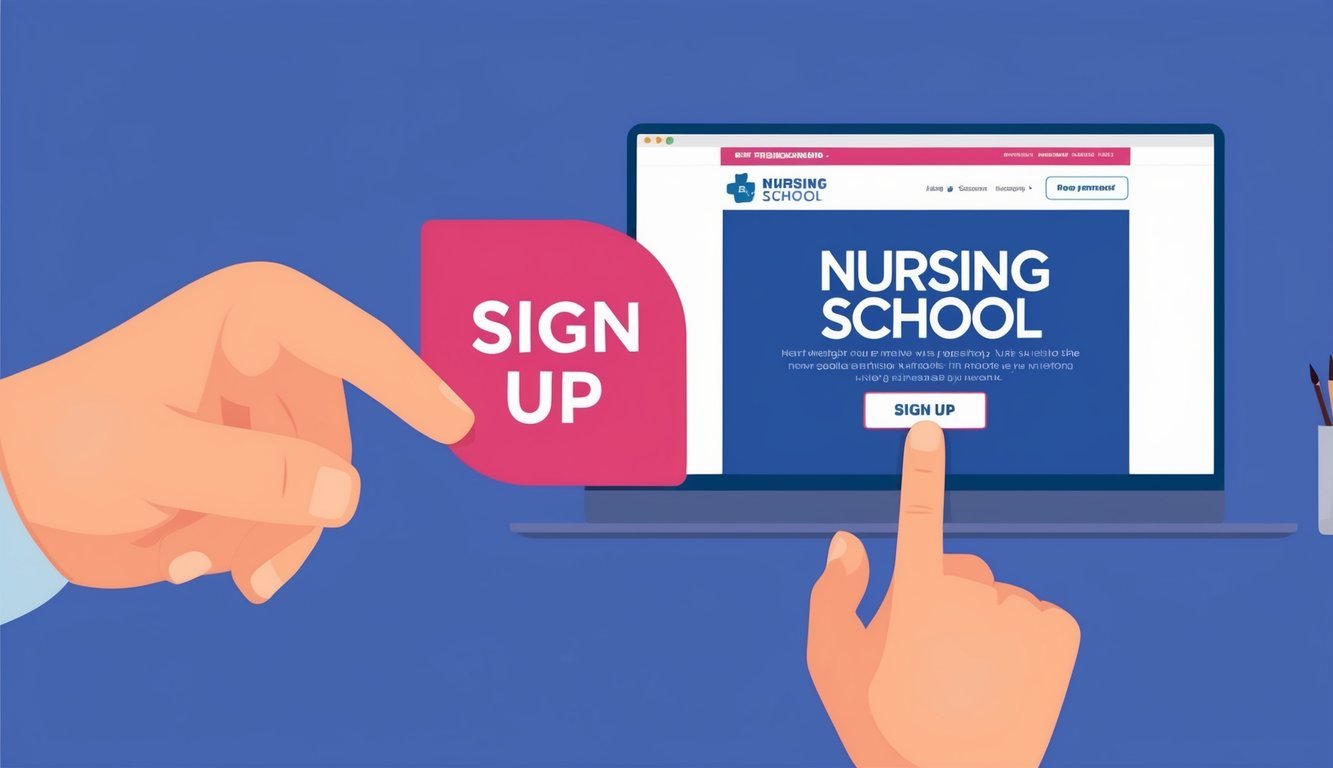“`xml
Thinking about nursing school? You’re definitely not alone! Many folks have that dream to become a nurse and make a real difference in people’s lives.
Getting into nursing school is just the first step on this exciting path.
Ready to sign up for nursing school? Here’s what you need: Complete high school or earn your GED, fulfill the program’s specific requirements, and submit an application. Each school has its own quirks, but most will want your transcripts, test scores, and maybe even a little face time in an interview.
Don’t stress if this feels daunting—thousands of aspiring nurses do it every year!
Nursing school can lead you to a fulfilling career.
Whether you envision yourself in a bustling hospital, a cozy clinic, or helping out in a community health center, the options are plentiful.
With enough hard work and dedication, you could soon be on your way to touching lives every single day.
Key Takeaways
- You’ll need a high school diploma or GED, plus specific program requirements for nursing school.
- The application process often includes transcripts, test scores, and possibly an interview.
- A nursing degree offers diverse career opportunities across various healthcare settings.
Starting Your Nursing School Adventure
Getting started with nursing school does require some planning.
You’ll want to choose the right program, meet any prerequisites, and gear up for your classes.
Let’s break down the key steps to kick off your nursing career.
Understanding Nursing Basics and Degrees
Nursing is a wonderful profession that allows you to help others every day.
There are a few different kinds of nursing degrees out there.
The main degrees are:
- ADN (Associate Degree in Nursing)
- BSN (Bachelor of Science in Nursing)
ADN programs usually take about 2 to 3 years to complete, while BSN programs typically last four years.
Both paths will lead you to become an RN (Registered Nurse).
Some people start with an ADN and then work towards a BSN later.
This pathway is often called an RN-to-BSN program.
Nurses can find jobs in hospitals, clinics, schools, and a lot more.
The job outlook for nursing is bright, with a steady demand for qualified professionals.
Finding the Right Nursing Programs
Choosing the right nursing school is a big deal, and it’s important to explore your options thoroughly.
Here are some things to consider:
- Cost
- Location
- Type of program (ADN or BSN)
- School accreditation
- Pass rates on nursing exams
- Job placement rates after graduation
If life’s busy, online programs are a solid choice worth looking into.
They can fit comfortably into your schedule.
Visiting schools and chatting with current students can also give you a better feel for the program and campus vibe.
Plus, check if any credits can transfer if you think you might switch schools later on.
Meeting Nursing School Requirements
Nursing schools have certain requirements you’ll need to meet, which can vary by institution, but they often include:
- High school diploma or GED
- A minimum GPA (which is often 2.5 or higher)
- Science classes like biology and chemistry
- Math and English classes
Some programs may also ask for:
- Volunteer hours in healthcare settings
- CPR certification
- Letters of recommendation
- Scores from entrance exams
It’s smart to start prepping for these early.
Creating a checklist of what each school requires can keep things organized.
Extra science classes can be helpful in gearing up for nursing school.
Many students also work as nursing assistants to gain valuable experience.
Navigating the Application Process
Getting into nursing school takes a mix of planning and effort.
Below are some key parts of the application process, from putting together your materials to figuring out how to pay for school.
Gathering Your Application Materials
To get that application rolling, you’ll want to gather everything you might need for your nursing school application.
Most schools ask for:
- High school diploma or GED
- Official transcripts
- GPA (many programs want at least a 3.0)
- Letters of recommendation
- A personal statement
Staying organized is key! Consider using NursingCAS, an online application system that allows you to apply to multiple programs at once.
Double-check each school’s deadlines and requirements to keep track of when things are due.
Trust me, being organized can really help reduce stress and give you a better chance of submitting a strong application.
Fill out your applications carefully and don’t hold back on mentioning any volunteer work or healthcare jobs you’ve done.
And, of course, give everything a once-over before sending it in!
Taking Entrance Exams
Heads up! Many nursing programs require entrance exams as part of the application process.
Two common tests are:
- ATI TEAS (Test of Essential Academic Skills)
- HESI A2 (Health Education Systems, Inc. Admission Assessment)
These exams check your knowledge in math, science, and reading.
Schools use your scores to help select their students.
Don’t snooze on studying—prep guides and practice tests can be super helpful! Some students find it useful to take a prep course or work with a tutor.
Plan to take the test early in case you need to retake it.
Aiming for higher scores can really make your application pop.
Financing Your Nursing Education
Nursing school can hit your wallet pretty hard, so it’s smart to explore different ways to pay for it:
- Fill out the FAFSA (Free Application for Federal Student Aid)
- Look into grants and scholarships for nursing students
- Check if your job provides any tuition assistance
- Consider federal and private student loans
Many nursing schools also offer financial aid.
Don’t hesitate to ask about work-study programs or part-time jobs that could help offset costs.
Some hospitals even offer tuition help if you’re willing to work for them once you graduate.
And don’t forget to research loan forgiveness programs available for nurses, too.
Starting to save a little now can make a big difference later!
Frequently Asked Questions

Feeling lost in the nursing school application maze? You’re not alone! Here are answers to some common questions about entering nursing programs, meeting requirements, and finishing up quickly.
What’s the deal with applying for nursing school online?
Online applications for nursing schools can make things a whole lot easier. NursingCAS allows you to apply to multiple schools with just one electronic application.
It’s managed by the American Association of Colleges of Nursing.
You simply fill out your info, upload your documents, and submit everything—all in one place.
Talk about a time-saver!
Got any pointers for meeting the requirements to get into nursing school?
Meeting nursing school requirements can feel overwhelming, but you can do it! Focus on maintaining good grades, especially in those crucial science classes.
Volunteering at local hospitals or clinics can give you a leg up, too.
Practice tests for your entrance exams are a no-brainer.
Oh, and avoid any drug tests disasters; schools have strict standards for future nurses.
Why is it so tough to land a spot in nursing school?
Nursing programs often have limited openings.
There’s high demand, but not enough faculty or clinical spots.
Many qualified applicants are chasing after those coveted slots.
Schools have to keep a certain student-to-faculty ratio to ensure a quality education, which can make getting in that much harder.
What’s the minimum age to start pursuing a nursing degree?
Most nursing schools want students to be 18 by the time their clinical rotations begin.
Some programs may accept younger students to take pre-nursing courses beforehand.
Just keep in mind that rules can vary based on school and state, so checking with specific programs is always a good move.
Can you break down the minimum requirements to become a nursing student?
Generally, you’ll need a high school diploma or GED.
Most schools look for a minimum GPA—around 2.5 or 3.0 is common. Prerequisite courses include biology, chemistry, and math.
Plus, many programs need you to take entrance exams like the TEAS or HESI, and some prefer volunteer experience or a background in healthcare.
What’s the speediest route to graduating from nursing school?
If you’re looking to get your RN quickly, an Associate Degree in Nursing (ADN) program is often your best bet—it usually takes about two years.
There are also accelerated BSN programs for people who already have a bachelor’s in another field, and those can take just 12-18 months.
Traditional BSN programs typically span four years but open up more career options down the road.
“`

